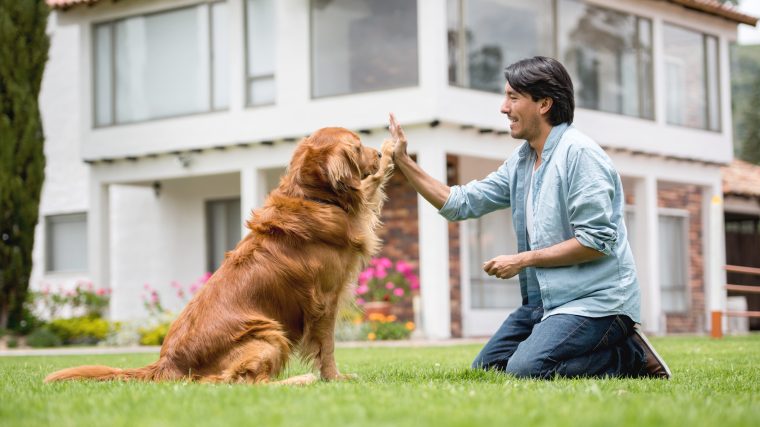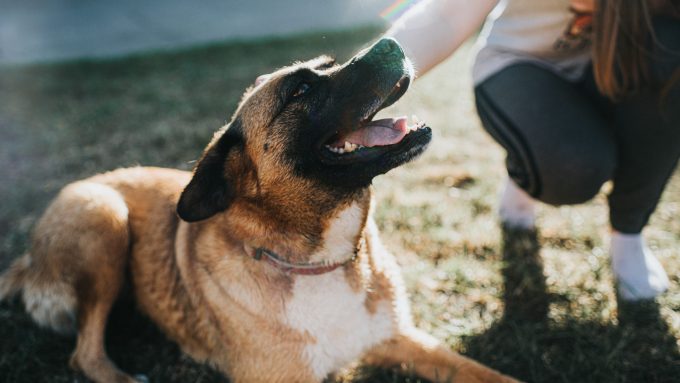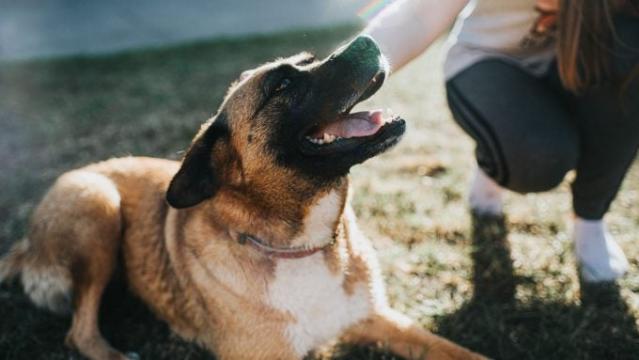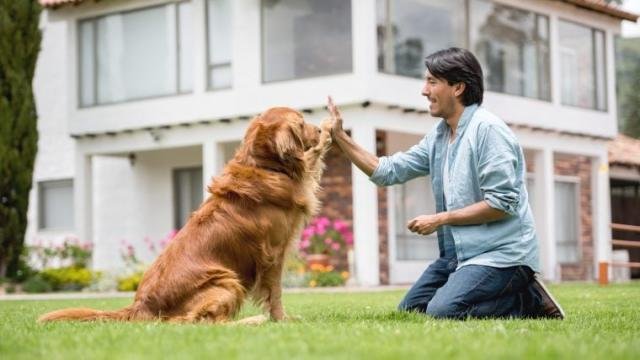A dog behaviorist can help your pup by addressing behavioral issues and aiding in their training and socialization. With their expertise, the behaviorist can identify the root causes of problematic behaviors and develop tailored strategies to modify them, ultimately improving your dog’s behavior and overall well-being.
They can also provide guidance and support to pet owners to ensure that they can effectively manage and prevent future issues. By working closely with a dog behaviorist, you can enjoy a stronger bond with your furry friend and create a harmonious environment for both of you.
Trust a professional behaviorist to be your reliable resource for an obedient and happy pup.

Credit: dogtime.com
Benefits Of Hiring A Dog Behaviorist
Dogs are known for their loyalty and companionship, but sometimes they may exhibit problematic behaviors that can be challenging for their owners. In such situations, enlisting the help of a dog behaviorist can make a world of difference. A dog behaviorist is a trained professional who specializes in understanding and modifying a dog’s behavior. They can help address behavioral issues, improve socialization skills, and enhance obedience training. Let’s explore these benefits in more detail.
Identifying And Addressing Behavioral Issues
When it comes to your pup’s behavior, it’s essential to identify and address any issues promptly. A dog behaviorist can help you pinpoint problematic behaviors like aggression, fear, separation anxiety, or excessive barking. By observing your dog’s actions and interactions, they can determine the underlying causes of these behaviors. Whether it’s due to past trauma, lack of socialization, or other factors, a behaviorist can develop a tailored plan to address and modify your dog’s behavior.
With their expertise, a dog behaviorist can provide effective techniques and strategies to address behavioral issues. By focusing on positive reinforcement and reward-based training, they can help reshape your dog’s behavior into more desirable patterns. Their guidance and support can significantly improve your dog’s quality of life while also alleviating stress and frustration for both you and your furry friend.
Improving Socialization Skills
Socialization is crucial for dogs to develop appropriate behavior and interact harmoniously with other animals and humans. A dog behaviorist can play a vital role in helping your pup improve their socialization skills. They can assess your dog’s current level of socialization and develop strategies to gradually expose them to various environments, people, and animals.
Through controlled and positive experiences, a dog behaviorist can help reduce fear, anxiety, and aggressive tendencies that may arise from poor socialization. By facilitating positive interactions during structured training sessions, they can instill confidence in your dog and promote healthy relationships. These improved socialization skills can lead to a more balanced and well-rounded furry companion.
Enhancing Obedience Training
Obedience training is essential for every dog. It establishes boundaries, improves communication, and ensures a safe and enjoyable relationship between you and your pup. A dog behaviorist can enhance your dog’s obedience training by providing specialized techniques and guidance.
They can help you teach your dog basic commands like “sit,” “stay,” and “come” through positive reinforcement methods. Additionally, a behaviorist can help address any challenges you may encounter during the training process, such as stubbornness or distractions. They will customize the training program based on your dog’s unique temperament, ensuring that it is effective and suits your dog’s individual needs.
In conclusion, hiring a dog behaviorist can bring numerous benefits to both you and your pup. They have the skills and knowledge to identify and address behavioral issues, improve socialization skills, and enhance obedience training. By enlisting their help, you can build a strong and harmonious bond with your four-legged companion, making life more enjoyable for the entire family.
Methods Used By Dog Behaviorists
A dog behaviorist is a professional who specializes in understanding and modifying canine behavior. They use various techniques and methods to help improve your pup’s behavior and overall well-being. Through positive reinforcement techniques, behavior modification exercises, and implementing structured routines, a dog behaviorist can effectively address behavioral issues and create a positive environment for your furry friend.
Positive Reinforcement Techniques
Positive reinforcement is an essential tool used by dog behaviorists to encourage and reward desired behaviors in dogs. This technique involves providing rewards, such as treats, praise, or playtime, whenever your dog displays the desired behavior. By rewarding good behavior, your pup learns to associate positive outcomes with specific actions, making them more likely to repeat those behaviors in the future.
For example, if your dog is exhibiting aggressive behavior towards other dogs, a behaviorist may use positive reinforcement by rewarding your pup for calm and relaxed behavior during encounters with other dogs. Over time, your dog will learn that remaining calm results in positive rewards, helping to reduce aggression and improve their overall behavior.
Behavior Modification Exercises
Behavior modification exercises aim to change problematic behaviors by gradually exposing the dog to triggering situations in a controlled and positive way. These exercises are tailored to address specific behavioral issues and are designed to teach your pup alternative behaviors that are more appropriate and desirable.
Let’s say your dog becomes anxious or fearful during car rides. A behaviorist may use behavior modification exercises by initially associating the car with positive experiences, such as short trips to fun locations or giving treats inside the car. As your pup becomes more comfortable, the duration and intensity of car rides can be gradually increased, reinforcing the positive association with traveling in the car.
Implementing Structured Routines
Dogs thrive with routine and structure, and a dog behaviorist understands the importance of implementing structured routines to enhance their overall behavior. By following a consistent schedule for meals, exercise, playtime, and training, your pup becomes more predictably and positively engaged in their daily life.
A behaviorist may suggest creating a structured routine for your dog, including designated meal times, regular exercise periods, and consistent daily training sessions. This routine provides your dog with a sense of stability and security, reducing anxiety, hyperactivity, and other problematic behaviors that can arise from a lack of structure.
In conclusion, dog behaviorists employ various methods to help improve your pup’s behavior and well-being. Positive reinforcement techniques, behavior modification exercises, and implementing structured routines are just a few of the effective strategies used by these professionals. By understanding and implementing these techniques, you can ensure a happy and well-behaved canine companion.
When To Seek Help From A Dog Behaviorist
If your furry friend is demonstrating any concerning behaviors that are impacting their quality of life or your own, it may be time to seek help from a professional dog behaviorist. These experts specialize in understanding and modifying your pup’s behavior to ensure a harmonious relationship between you and your beloved pet. Here are some common signs that indicate it’s time to consult a dog behaviorist.
Excessive Barking Or Aggression
If your dog has developed a habit of excessive barking or displays aggressive behavior towards people or other animals, it’s crucial to address the issue as soon as possible. A dog behaviorist can evaluate the underlying causes of aggression or excessive barking and develop a tailored training plan to rectify these unwanted behaviors. By addressing the root cause, a behaviorist can help your pup become more relaxed and sociable, creating a more peaceful environment for everyone.
Separation Anxiety Issues
Does your dog become anxious or distressed when you leave the house? Separation anxiety is a prevalent problem among dogs, resulting in destructive behaviors such as chewing furniture, excessive whining, or soiling the house. A dog behaviorist can work with you to develop strategies and techniques to alleviate your pup’s separation anxiety. By implementing a customized training plan, a behaviorist can help your dog feel more secure and comfortable when left alone, reducing stress for both you and your furry friend.
Fear Or Phobia-related Problems
Dogs can develop various fears or phobias, such as fear of thunderstorms, fireworks, or being around unfamiliar people or animals. These anxieties can severely impact their well-being and overall happiness. A dog behaviorist can employ desensitization and counterconditioning techniques to help your dog overcome these fears gradually. By creating positive associations and gradually exposing your pup to their fears in a controlled manner, a behaviorist can help your furry friend build confidence and resilience.
Seeking help from a dog behaviorist can have a profound impact on your pup’s behavior and well-being. Remember, you are not alone in this journey, and professional guidance can provide you with the tools you need to understand and address your dog’s behavioral issues effectively.

Credit: dogtime.com
Finding The Right Dog Behaviorist
When it comes to addressing behavioral issues in your furry friend, finding the right dog behaviorist is crucial. A skilled and experienced behaviorist can make a world of difference in helping your pup overcome their challenges and lead a happier, healthier life. Here are some key factors to consider when finding the right professional for your beloved pet.
Researching Credentials And Experience
Before entrusting your pup’s behavior to a dog behaviorist, it’s important to thoroughly research their credentials and experience. Look for certifications from reputable organizations such as the International Association of Animal Behavior Consultants (IAABC) or the Certification Council for Professional Dog Trainers (CCPDT). These certifications indicate that the behaviorist has met strict standards and continues to update their knowledge in the field.
Additionally, take a close look at their experience. How long have they been working as a behaviorist? Have they dealt with cases similar to your dog’s? An experienced behaviorist is more likely to have encountered a wide range of behavioral issues and have a proven track record of successful outcomes.
Considering Specialization And Approach
Different behaviorists may specialize in various areas or have preferred approaches in their practice. Take the time to understand their specialization and the techniques they use. For example, some behaviorists may specialize in fear or aggression, while others may focus on separation anxiety or excessive barking.
It’s essential to find a behaviorist who aligns with your pup’s specific needs. If your dog has a specific issue, look for a behaviorist who has experience in that area. Their approach should also resonate with you as a pet owner. For instance, if you prefer positive reinforcement training, seek a behaviorist who utilizes this approach and avoids aversive techniques.
Seeking Recommendations
When it comes to finding a reputable dog behaviorist, seeking recommendations can be immensely helpful. Reach out to your veterinarian, local animal shelters, or fellow dog owners for their suggestions. Personal recommendations can often provide valuable insights and firsthand experiences with behaviorists in your area. Additionally, consider reading online reviews and testimonials to gather more information about different professionals.
Compile a list of recommendations and conduct further research on each behaviorist to determine the best fit for your pup. Remember, finding the right dog behaviorist is a crucial step towards improving your dog’s behavior and ensuring their overall well-being.
Working With A Dog Behaviorist
A dog behaviorist can provide invaluable help to your pup by addressing and resolving behavioral issues using effective techniques and strategies. With their expertise and guidance, your dog can become a well-behaved and happy companion.
When it comes to training your furry companion, working with a dog behaviorist can make all the difference. These experts specialize in understanding and modifying canine behavior, helping your pup become a well-mannered and happy member of your family. From addressing specific behavioral issues to providing general training guidance, a dog behaviorist can offer valuable insights and techniques that are tailored to your dog’s individual needs.
Initial Assessment And Evaluation
Before any training begins, a dog behaviorist will conduct an initial assessment and evaluation of your pup. This allows them to identify any underlying issues or patterns in behavior that may need to be addressed. During the assessment, the behaviorist will observe your dog’s reactions, body language, and responses to various stimuli. This thorough evaluation helps to pinpoint the root causes of any behavioral problems your dog may be experiencing.
Customized Training Plans
Once the assessment is complete, the dog behaviorist will create a customized training plan specifically designed for your pup. This plan takes into account your dog’s unique personality, breed characteristics, and any specific issues identified during the assessment. It may include a combination of positive reinforcement techniques, behavior modification exercises, and obedience training. The goal is to provide your dog with clear expectations and consistent guidance to encourage positive behaviors.
Follow-up Sessions And Support
Training doesn’t end after the initial assessment and customized plan. A dog behaviorist will typically provide follow-up sessions and ongoing support to ensure that progress is being made. These sessions allow for further refinement of training techniques, reinforcement of learned behaviors, and the introduction of new challenges as your dog progresses. The behaviorist will also offer guidance on managing and preventing any potential future behavioral issues, helping you create a happy and harmonious relationship with your furry friend.

Credit: www.yahoo.com
Frequently Asked Questions For How A Dog Behaviorist Can Help Your Pup
How Can A Behaviorist Help My Dog?
A behaviorist can help your dog by assessing and modifying their behavior through training techniques. They can address issues like aggression, anxiety, and disobedience, providing you with strategies to manage and improve your dog’s behavior.
When Should A Dog See A Behaviorist?
A dog should see a behaviorist if they exhibit problematic behavior that can’t be resolved through training or if they have severe aggression or anxiety issues. Early intervention is key to address these problems and improve the dog’s overall well-being.
Does My Puppy Need A Behaviourist?
Yes, if your puppy is displaying concerning behaviors and obedience problems, a behaviorist can help. They will assess and address the root causes and provide guidance to improve your puppy’s behavior.
What Can I Expect From A Dog Behaviorist?
A dog behaviorist can help you understand and modify your dog’s behavior. They use their expertise to assess and analyze your dog’s actions and will provide guidance and training techniques to address any issues. Expect personalized advice and support in improving your dog’s behavior.
Conclusion
Enlisting the help of a dog behaviorist can greatly benefit your pup and improve their overall quality of life. With their expertise in understanding canine behavior and implementing effective training techniques, you can address behavioral issues, promote positive behavior, and build a stronger bond with your furry friend.
Investing in the guidance of a professional can bring harmony and happiness to your home.







